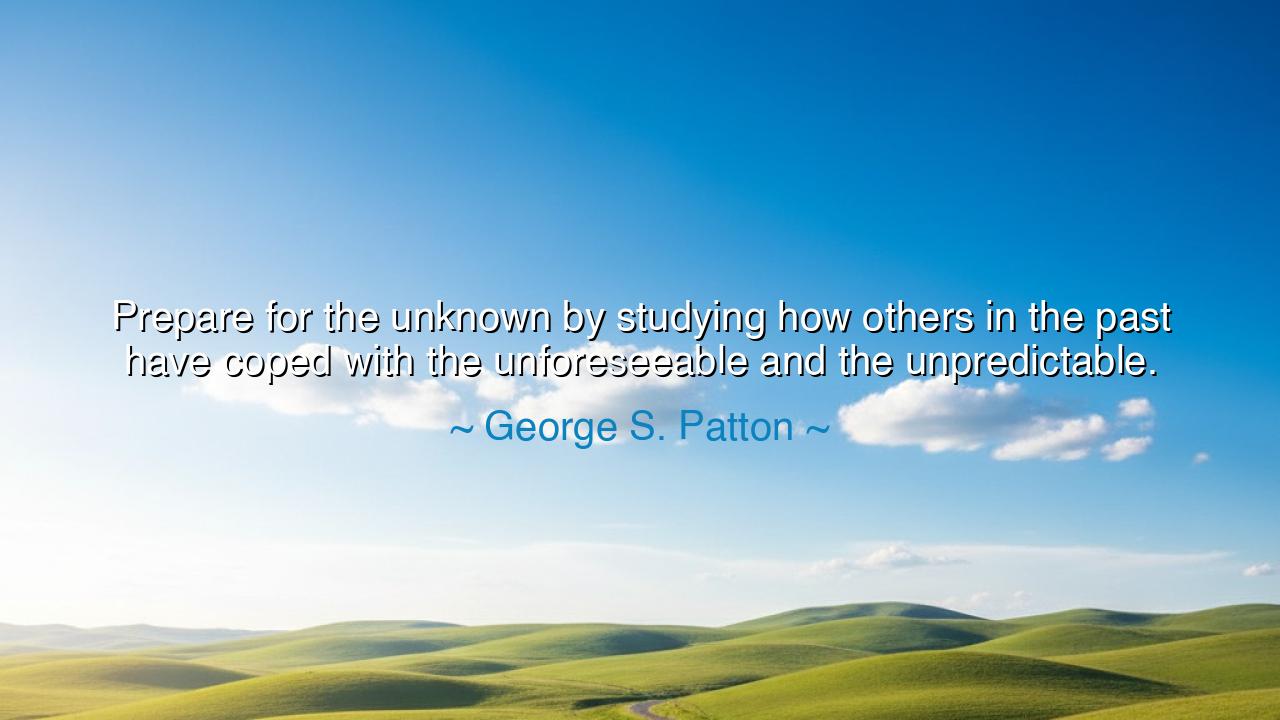
Prepare for the unknown by studying how others in the past have
Prepare for the unknown by studying how others in the past have coped with the unforeseeable and the unpredictable.






The mighty General George S. Patton, warrior of the twentieth century and master of strategy, once said: “Prepare for the unknown by studying how others in the past have coped with the unforeseeable and the unpredictable.” These words, forged in the fires of war and experience, speak not merely to soldiers, but to all who would face the storms of life. For the world is ever uncertain; the future hides its face from us all. Yet the wise do not tremble before the unknown—they prepare, and they prepare not in blindness, but through the hard-earned lessons of history.
To prepare for the unknown is to acknowledge that uncertainty is not the enemy but the natural state of existence. Life, like battle, unfolds in chaos. Plans may crumble; paths may twist; fortune may turn her wheel without warning. Yet in the records of the past lie the footprints of those who have walked this terrain before. Patton’s wisdom is thus a torch held high in the dark—it reminds us that while we cannot foresee what lies ahead, we can learn from those who faced storms like ours, who stood firm when the ground shifted beneath them. History, for the wise, is not dead—it is a map of the living.
Patton himself was a man who understood the past not as memory, but as a weapon. Before leading his armies across the fields of Europe, he devoured the writings of Julius Caesar, Napoleon Bonaparte, and Hannibal of Carthage. He studied their triumphs and their errors, their boldness and their folly. When he faced the German war machine, he did not rely on chance—he relied on knowledge drawn from centuries of human struggle. The unpredictable became less fearful to him because he had seen its shape in history’s mirror. From this deep well, he drew not just tactics, but courage—the calm born of knowing that others, too, had stood on the edge of chaos and prevailed.
Even in the ancient world, the sages taught this same truth. The philosopher Confucius declared that if one would foresee the future, one must study the past. The Romans, those masters of endurance, built their strength upon the lessons of earlier civilizations. They studied the Greeks in art and warfare, the Carthaginians in trade, and the Persians in governance. Thus, when new trials came upon them—barbarians, famine, fire—they were not unprepared. They faced the unforeseeable with wisdom gathered from generations, as a tree faces the storm with roots deep in the earth.
To study the past, then, is not a mere act of scholarship—it is an act of survival. In every age, men and women have faced disaster, upheaval, and change. Empires have fallen, plagues have come, and yet the enduring have always been those who learned. When the world burned with war, when nature raged with disease or famine, it was not the strongest who endured, but the wise—those who remembered what had been done before and adapted it to the new age. This is the secret at the heart of Patton’s words: that in studying how others have faced the unpredictable, we gain the armor of understanding against whatever the future may bring.
Let us recall, too, the example of Ernest Shackleton, the Antarctic explorer who found himself stranded with his men in the endless ice. No man could have predicted the breaking of the Endurance, nor the merciless winter that followed. Yet Shackleton, who had studied the failures of explorers before him, knew that despair was death. He relied on the lessons of history—discipline, faith, and unity—to lead his men home through the impossible. It was not prophecy that saved them, but preparation, drawn from the stories of those who had walked the razor’s edge before.
Thus, my children, learn this: the past is not gone—it waits for the seeker. Within its stories lie the weapons to face the unknown. Do not scorn history as old or irrelevant, for it is the book of human resilience. Study how the great and the humble alike have met uncertainty. Learn how they endured, how they failed, how they rose again. For though the form of danger changes—the spirit of courage, wisdom, and perseverance remains the same.
So let this be your lesson: when you stand before the unpredictable, do not fear. Look backward, and you will see the footprints of those who have conquered chaos before you. Read their words. Learn their ways. Prepare your spirit through their trials. For the unknown cannot defeat the one who knows that others have faced it and survived. As Patton himself showed, history is not a chain binding us to the past—it is a sword forged from it, gleaming in the hands of those who dare to prepare.






AAdministratorAdministrator
Welcome, honored guests. Please leave a comment, we will respond soon